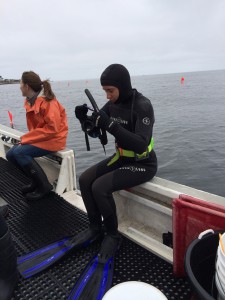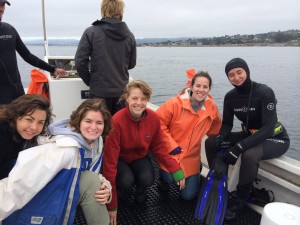Serena Thurston, California State University, Monterey Bay
Project: An investigative analysis of coastal upwelling dynamics on rockfish recruitment in central California
Advisor: Mark Carr
Regional climate models suggest that global climate change will alter sea surface temperature, the intensity and direction of winds and ocean currents, and the frequency, intensity and location of coastal upwelling along the west coast of North America. Past studies have suggested that all of these processes influence the transport and delivery of juvenile rockfish (genus Sebastes) to adult populations associated with kelp forests along the coast of California. As prevalent components of both recreational and commercial fisheries along the west coast of North America, rockfishes are both economically and culturally important. Predicted changes in ocean processes and observed effects on rockfish recruitment suggest that climate change may have profound effects on the size and dynamics of rockfish populations. The goal of this study is to better understand how changes in coastal winds and upwelling influence rates of larval recruitment to adult populations of rockfishes in central California. SMURFs (Standard Monitoring Unit for the Recruitment of Fishes) were deployed just offshore of coastal kelp forests to estimate annual variation the level of recruitment of three species of rockfishes: S. atrovirens, S. carnatus, S. chrysomelas. We applied multiple regression analysis to a multiyear time series of annual rates of rockfish recruitment and annual variation in winds, water temperature, chlorophyll (as a proxy of ocean production), and coastal upwelling indices.
We observed positive correlations between upwelling and recruitment during the recruitment season at both sites. Increased upwelling enhances larval food production and increases survival rates of the remaining larvae while in their pelagic phase. These results suggest the positive effect of upwelling on larval growth and survival outweighed the negative effects of offshore advection during the recruitment season.


